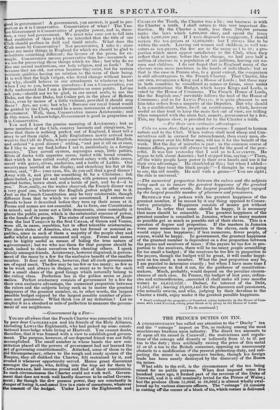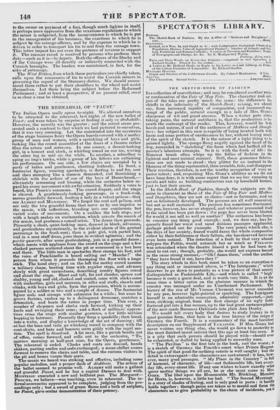THE PRINCE'S DUTIES ON TIN.
A CORRESPONDENT has called our attention to the" Duchy" tax and the " coinage " impost on Tin, as ranking among the most mischievous burdens upon industry. The direct tax amounts to 4/. upon all tin raised in Cornwall ; the restrictions arid regula- tions of the coinage add directly or indirectly from 1/. to 2/. per ton to the duty ; thus artificially raising the price of this metal Si. or 6/. a ton to the British consumer, opposing an unnecessary obstacle to a modification of the present protecting-duty, and sub- jecting the miner to an oppressive burden, though his foreign trade has been nearly destroyed by the discovery of the Banca tin mines.
What adds to the evil, is the circumstance of the tax being raised for no public purpose. When first imposed some five hundred years ago, it formed part of the revenue of the Duke of Cornwall, and it is still nominally levied for the Prince of Wales; but the produce (from 15,000/. to 20,0001.) is almost wholly swal- lowed up by various sinecure officers. The "coinage" (it consists in cutting off the corner of a block of tin, which corner is delivered
to the owner on payment of a fee), though much lighter in itself, is perhaps more oppressive from the vexatious regulations to which the miner is subjected, from the inconvenience to which he is put i in the management of his business, the exactions to which he s subject by the coinage-officers, and by the expense to which he is driven in order to transport his tin to and from the coinage town. This latter impost has not even the pretence of 'revenue to support it. The amount raised is received by persons who perform their duty—such as it is—by deputy. Both the officers of the Duchy and et' the Coinage were all directly or indirectly connected with the Cornish boroughs. The burden was maintained, in fact, for the sake of patronage. • The West Briton, from which these particulars are chiefly taken, calls upon the consumers of tin to assist the Cornish miners in procuring the repeal of the Stannary-duties. We should recom- mend them rather to put their shoulders to the wheel and assist themselves. Let them bring the subject before the Reformed Parliament ; and at least a prospective, if no present relief, must in so clear a case be obtained. •























 Previous page
Previous page